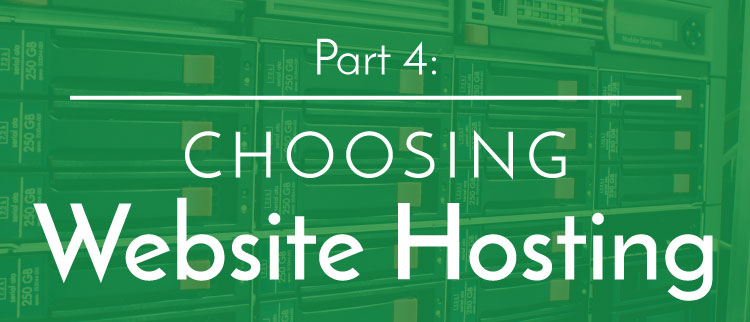Choosing a Hosting Company
When you build a website, your files must be stored somewhere. In other words, they must be “hosted.” That’s the purpose of paying for a hosting company for your website.
There are thousands of hosting companies available to choose from, with varying costs. Sometimes, it’s difficult to choose the right one. That’s why we’re going to discuss some important points for you below, to help you make the right decision.

Your objective in this chapter is to learn what to look for in a hosting company, dispel some myths about hosting companies, and understand the pros and cons of some major hosting companies.
What is Hosting?
Website hosting is the process of storing files for your website so people can see them on the internet.
A hosting company then owns a number of servers, similar to your computer, where it stores all its files. The size of a hosting company will vary from ones with tens of thousands of servers across the country, to someone who stores two servers in his basement to everywhere in between.
In addition, there are hosting companies that simply resell another company’s services. For example, some people rent a server from a company, then rented that space out to 20 different people.
What should I look for in a hosting company?
The size of your business will determine what you should look for in a hosting company. For the purposes of this article, we will focus on a business or company that does not expect to receive more than 20,000 visitors per month. (If you anticipate more than 20,000 visitors, we encourage you to speak to and work with an IT professional who can create a custom solution for your business.)
Customer service
 One of the most important factors in choosing a host is a highly rated customer service. Over the course of your website ownership, there’s a good chance you’re going to need to contact your hosting company. You do not want to choose a host that takes more than a week to respond. If you choose a large hosting company, you may have great customer service, but find yourself waiting 30 minutes to an hour to talk to a representative.
One of the most important factors in choosing a host is a highly rated customer service. Over the course of your website ownership, there’s a good chance you’re going to need to contact your hosting company. You do not want to choose a host that takes more than a week to respond. If you choose a large hosting company, you may have great customer service, but find yourself waiting 30 minutes to an hour to talk to a representative.
If you want to “test” their customer service, give them a call, or start a chat with them to see how fast and accurately they respond. This should help you determine if you would like to work with them or not.
Easy to use interface
Having a easy to use interface is also important. Most of the hosting companies use a program called “CPanel” which is pretty easy to use and offers helpful tutorials. Some create their own program; some are good, some are bad. Know what they offer, and what you’ll have to pay if you need to add certain features.
Bandwidth, disk space and uptime guarantees
Some companies tout these features as “important.” At face value, they may seem that way. Bandwidth and disk space are sold as unlimited on most of these sites; however, once your website receives a large amount of traffic, they will either throttle your account (making it slow so visitors get frustrated and leave) or simply shut down your account.
A “99% uptime guarantee” sounds great. However, that means you site could be down for 3.5 days per year! Most hosting companies offer this guarantee so don’t be fooled by someone offering it as a unique feature.
Where Should My Server Be Located?
The hosting server for your website should be located in the country where your visitors are primarily located. For a US-based business, the server should be physically located in the US. Most hosting companies have servers in all the major countries. If you’re from a smaller country, look for a hosting company in your area that has positive reviews. The further away your server is from the visitor, the longer it takes the website to load. Florida to New York might only take a few additional milliseconds, but from the UK to the US it may take a few seconds longer (which will, in turn, affect your website).
What Type of Hosting Do I Need?
The most important factor determining what type of hosting you need is the amount of visitors you expect to receive.
I expect under 5,000 visitors per month
If you expect to have under 5,000 visitors a month (about 167 per day), you should be fine using a shared hosting account (usually the least expensive). You need to be aware that you are essentially “sharing” the server’s resources with other websites. In the event that they have a huge spike in visitors, or if too many people are sharing the server, your site will slow down. If you are using shared hosting, make sure to navigate around your site every few weeks to make sure you don’t notice any speed issues. If you do then it might be time to upgrade.
I expect over 5,000 visitors per month
Option 1: Virtual Private Server
 For businesses expecting more than 5,000 visitors per month, one option is the Virtual Private Server (VPS). A VPS is a great route for businesses not wanting to pay a ton of money but want the next step up. It’s perfect for businesses getting some (but not huge amounts) of traffic. You are sharing a server, but are essentially creating a “virtual” environment on the server which provides you with the benefits of a private server at a reduced cost. You will have a dedicated amount of resources on the server so even if someone else on the server has a traffic spike, you will not be affected.
For businesses expecting more than 5,000 visitors per month, one option is the Virtual Private Server (VPS). A VPS is a great route for businesses not wanting to pay a ton of money but want the next step up. It’s perfect for businesses getting some (but not huge amounts) of traffic. You are sharing a server, but are essentially creating a “virtual” environment on the server which provides you with the benefits of a private server at a reduced cost. You will have a dedicated amount of resources on the server so even if someone else on the server has a traffic spike, you will not be affected.
Option 2: Dedicated Hosting Account
For businesses expecting to generate large amounts of traffic, that just want more control, a dedicated server is a great option. These typically start at around $100-$140 per month and offer greater control. Price shopping is a good idea; however, if one company is dramatically less than another, there is usually a good reason, so buyers beware. Most of the companies should be around the same price for the same features.
What Are the Best Hosting Companies?
The best hosting companies vary from year to year, sometimes even from month to month. At the time of this article, these are the companies that have been reliable for a number of years and therefore have built up credibility. We encourage you to do your own research and contact them with your own questions before making a final purchase, to make sure you’re still receiving a high quality product.
Host Gator – This industry leading company is built around hosting, and has been around for years. While they are experts at solving issues, due to their massive growth and volume, a typical wait to speak to a representative is 45+ minutes. We use them and still think their customer service outweighs the wait. Host Gator also has an extensive support section with a variety of tutorials for troubleshooting. In addition, they have competitive pricing and will grow with your business from start-up to millions of visitors per month.
Host Gator is owned by Endurance International Group (EIG), which owns a majority of the hosting companies you will find online. EIG owns: A Small Orange, Bluehost, Dot5Hosting, FatCow, Hostnine, HostMonster, iPage, JustHost and Arvixe. So, if you were planning on buying from any of those companies, we recommend just using Host Gator because the product is almost exactly the same.
GoDaddy – This is the other major player in the hosting space. They are well known and offer a wide variety of services. Their prices are very competitive and they run sales all the time. Their customer support is also very helpful; however, just like the others, you should expect a long wait time. Some think their shared hosting slows their website. This issue can typically be resolved by contacting GoDaddy’s support.
Other hosts are available if you choose to go another route. However, we have not personally used them so we cannot in good conscience recommend them.
Final Thoughts
After reading and working through this chapter, you’ve met your objective of: learning what you need to know when choosing a hosting company, dispelling some myths about hosting companies, and understanding the pros and cons of some major hosting companies.
Hosting can be a bit daunting to set up, but once completed, you shouldn’t have to spend any additional time on it. As a note, we encourage you to keep the e-mails you receive from the host company in a safe location, so if you need to reference them quickly you can. Our final helpful hint: make sure you have a valid credit card on file, so you don’t forget to pay your bill and lose your website! Yikes!